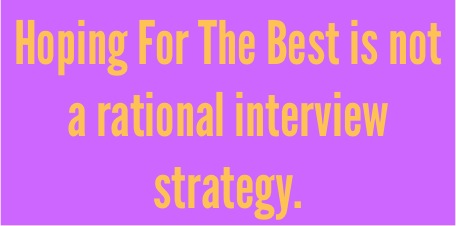They can tell, you know.
When I was hiring people, my team and I could always tell when someone had done their homework on the company or not. The bottom line was if they didn’t do the research, they were out.
In retrospect it’s regrettable we even had to waste an interview on someone who didn’t investigate us. Unfortunately testing for whether or not you did employer research is not a significant part of the screening process.
Digging in and researching an employer better than the other candidates gives you a huge competitive advantage in an interview.
It’s such an easy way to make inroads yet so many people go into interview unprepared. “Hoping for the best” is not a rational interview strategy.
If you want a quick refresher course, see my blog on how to get interview ready in 3 hours. Even if you’re strapped for time there’s a quick and dirty way to get ready.
There’s no excuse for not showing up prepared to talk about the organization you’re interviewing with, the people in it, their competition, competitive advantage, and biggest problems you are going to help them solve.
But how, you wonder, will you ever get prepared for those conversations? Well, I’ve got 5 ideas for you that really work. Check them out, and then try them out, and see for yourself!
1. Search for executive activity.
Look for employer execs and see if they have any LinkedIn media including company videos, slide decks, or other messages included on their profiles that can provide a deeper level of information.
Also, Google executive names and “interview” and see if you can find other media or press interviews that will give you a sense for the organization’s mission and strategy. Bring this intel into the interview conversation, and think about how you can weave it into your stories as you are preparing.
2. Talk to a customer.
Ask them what works well, and what they see as opportunities for improvement. Take notes, and listen for an opportunity to bring this into your interview conversation. Especially helpful to flavor your responses to questions about how you see yourself adding value in the organization.
3. Talk to a competitor.
Ask what they see as their competition’s strengths and weaknesses. As above, look for opportunities to share that (i) you’ve talked to the competition, and (ii) you have a sense for how the employer fares in the market, and (iii) you can talk intelligently about that.
This will make you memorable. It may even blow their minds.
\
4. Conduct a transaction with the organization.
If they have a product that’s affordable, buy it and use it.
Call or message the customer care organization and see what kind of response you get. This will tell you a lot about the organization’s culture and practices.
You know what I’m going to say here, use this as commentary; compliment them on excellent work, or, propose ideas on how to improve the customer service, or other, experience.
5. Hit up the company on social media, and see how they respond.
Give a shout out to the organization on social media. It can be a Facebook group, Twitter, LinkedIn or other forum.
This will give you an idea for how they deal with constituents, and what their public voice is. It will also tell you about their culture, and how their social media practice compares with their values and principles as an organization.
These research techniques will help ensure you have an engaging conversation during your interview.
On one hand, the organization will get a much better sense for what you offer, based on your feedback and observations from these research experiences.
And on the other hand, YOU will have a much better idea if that organization is for you.
Research not only helps the employer pick you, it helps you pick the right employer.That’s an important part of the interview process we don’t talk enough about!
Your action for this week:
Try one of these unique research methods on a target employer. See how it shifts your readiness and confidence, for the interview.


